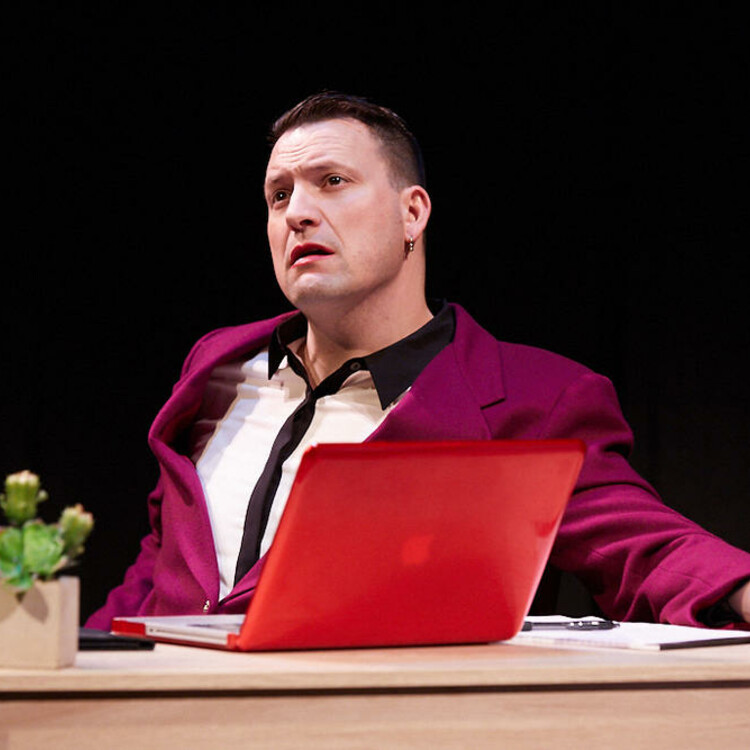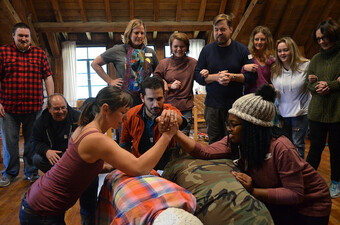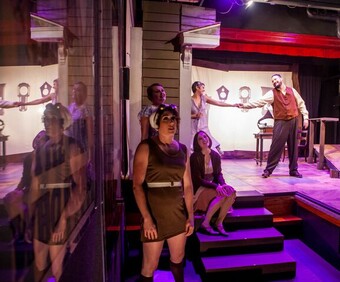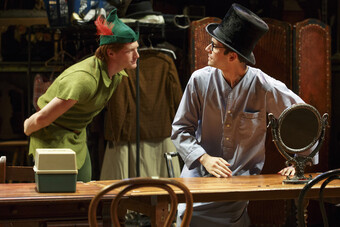I Do Community Theatre
This piece was written in response to the conversation around the definition of “professional” theatre prompted by Jonathan Mandell’s NewCrit piece, “Shows for Days.”
Hi. My name is Eli Keel. I do community theatre.
I grew up in a theatre family. My earliest memories are of falling asleep curled up in a theatre seat, listening to my mom, the director, give notes after a run.
My parents worked in a string of academic and community based theatres throughout my childhood—the Gingerbread Playhouse, Coffee High school's tiny drama program, Paducah Community College, the Youth Performing Arts School, and dozens of other companies and schools.
Sometimes they did theatre for money, sometimes they did it for love, and eventually all of my siblings and I ended up doing theatre, too.
And by God, whether we were getting paid or not, we considered ourselves professionals.
Our behavior, our standards, the way we were taught to always show up fifteen minutes early, always warm up, and always have pencil: this is what made us professionals.
I couldn't have described it then, but the word itself was a talisman. Professional. Sure, my mom taught English classes, my dad worked odd jobs between building sets, and it would no doubt take a team of detectives, a certified accountant, and a time machine to figure out if the majority of my parents' income over the years came from theatre. But the word meant something.
The social sciences have the phrase "achieved identity" to describe how people come to see themselves throughout their lives. Achieved identity is incredibly important to people, emotionally and psychologically.
I was not a professional. This tore away a fundamental part of my achieved identity. And it hurt like hell.
I do my best to respect others' achieved identity, and for actors, authors, and artists all over the world, "professional" is deeply rooted in how they see themselves.
But not me. Not anymore. Somewhere in my twenties I flaked out. In terms my parents would have used, I became "undependable," which in my house was the direst, most horrible thing you could say about a theatre person.
The exact journey is unimportant, but I quit doing theatre for about five years. I realized I was never going to be famous. I was never going to be rich. My relationship with rejection would probably keep me from even ever really making my money off theatre, or dance, or writing.
I was not a professional. This tore away a fundamental part of my achieved identity. And it hurt like hell.
In the absence of theatre, I became more interested in communities; social justice communities, business communities, the non profit community, and the child care community. I made my living doing other things.
One day I realized I missed doing theatre, and I started going to auditions again. But I didn't stress it too much.
I still do all the things my parents taught me were the hallmarks of a professional. I show up early, I warm up. I usually remember to bring a pencil.
But I'm not a professional.
I started writing again. I work hard, I turn in drafts, and my plays are getting produced around town.
But I'm not a professional.
Weirdly, I am now making much of my income as a theatre and cultural critic in my chosen town of Louisville, Kentucky. I'm getting some small paid theatre gigs, too. I'm making more money off theatre than I ever did as "a professional."
But I'm not a professional.
Somewhere in there I realized that the word "professional" had become toxic to me over the years. The amount of self-shaming I did for the money I was or wasn't making as a "professional" had contributed to a downward spiral, until, halfway through my junior year in a liberal arts college, I realized I was never going to be a professional and sat in the public stairwell of the Creative Arts Center for half an hour and cried.
And I do my best to respect the achieved identities of the theatre professionals around me. The word is still important to many of them. Sometimes they change it to “semi-professional,” and I hear students and academics call it “pre-professional.” “Pro-sumer” is a combination of “professional” and “consumer” that I suspect is really only used by advertisers. But if you wanna call yourself that, mazel tov.
This isn't about me criticizing people who self-identify in any of those ways. Happy creating to each of you.
But professional is a word that hurt me, and communities are the things that healed me.
Not for nothing, but we are living in an age when we get to choose our communities. I could be a sports fan, or a gamer, or build houses for Habitat for Humanity, or a zillion other things. But my real friends, my chosen family, my loved ones, they almost all do theatre. Many of them get paid. Many of them don't. The ones that don't make theatre are board members, boosters, donors, and most importantly, an audience.
That's my community.
If I continue to make money writing about theatre, or if I make more money as an actor, or if I start getting paid for my theatre writing, I will still proudly say:
My name is Eli Keel. I do community theatre.








Comments
The article is just the start of the conversation—we want to know what you think about this subject, too! HowlRound is a space for knowledge-sharing, and we welcome spirited, thoughtful, and on-topic dialogue. Find our full comments policy here
Nice article, and I appreciate your perspective. One of the problems that has driven this conversation over the years is our culture's continuing denigration of the term "amateur", literally French "for the love of", and it's widespread equation with "of poor quality". At the beginning of the 20th Century the term possessed an ennobled meaning: athletes in the burgeoning modern Olympics wore the word as proudly as the medals they won in the Games. But, the advent of high-paid "professional" sports a couple of decades later in large part started a cultural shift that pushed the idea of being an amateur, whether one be an athlete or an artist, down into the equivalent of a dilettante, a dabbler; someone either not serious about the craft, or not good enough to pursue it at a professional level. It's reached a point today where no one in our art form wants to own the term, and everyone bends over backwards to self-identify as some sort of convoluted "hyphenated-professional", because that sounds better than being pegged as a lowly - and therefore untalented - amateur. Maybe it's time to create a movement to take the word back, to return it to it's original, elevated definition, so that in the future, people in your situation: talented, experienced, dedicated, competent artists - who just don't happen to make a living from doing the art they love and are good at - can proudly say "I am an amateur", and the rest of society will accept that as the term of honor and respect it should be.
Thank you. This post is such a gift. I am officially going to bookmark this and look back at it every time I begin to slip and let the word "professional" hurt me again. This perfectly and succinctly encapsulates a message that desperately needs to spread. Thank you for this rejuvenating balm.
Excellent article. I face this issue on a regular basis when trying to stage productions with the Ismaili Muslim community worldwide. The challenge is to achieve what are "professional" standards of excellence with voluntary community theatre artists. Our work is fueled by love and devotion; passion for dramatic literature; the work itself is the reward. p.s. I say "our work" because I am both a professional and voluntary theatre worker. We have recently created an ensemble known as Drama Wallah (just like when a tea maker in India is called Chai Wallah). Our dramas can be sweet or spicy (masala).
Hafiz Karmali www.hafizkarmali.com
This made me want to jump up and applaud. When you're young, the idea of being a "theatre professional" is so liberating. But so often in adulthood, it feels like a burden. Kudos for this. Great piece.
PS: I've worked with so many incredibly talented and dedicated actors who don't get paid for the work they do. Conversely, I've worked with some mediocre, lazy, and difficult people who make more money acting "professionally" than I can imagine. These labels don't necessarily indicate talent or work ethic, for sure.
Loved this article, Eli. For folks that ended up doing it on a "professional" level, most would never, ever have gotten there without doing a TON of "community" first. Community theatre is how most of us met our network of friends and colleagues, and it's how we learned to grow and get better. Community theatre prepares you for the hard work. If you can go to rehearsal night after night after your day job, piece together your own costumes, and spend all of your free time learning lines and hanging up posters for your show, only to perform for 14 people in the audience (and you know every single one of them), then you know you really love the work itself, and that's so paramount. I've worked "professionally" with some folks that didn't seem to embrace the WORK and they didn't seem grateful for the paycheck, which blows my mind. It's too hard a thing to do if you don't love it. I think most theatre artists, whether they pay their bills via acting or not, found their love of it doing community theatre. It's open to everyone, no matter your experience level. Everyone gets a chance to play! Acting makes people better people. COMMUNITY THEATRE FOR EVERYONE!
this was touching.
A very interesting article. I think there is a strong line between professionalism and being a professional. I think there is a lot of shaming in the profession against people who claim to be professional. Going back to the basic definition:
Professional: adjective:
1. of, relating to, or connected with a profession.
2. (of a person) engaged in a specified activity as one's main paid occupation rather than as a pastime.
noun:
1.a person engaged or qualified in a profession.
So the adjective version has two definitions. Being connected to the profession and being engaged in a pastime or hobby. The problem to me is that the hobbyist and the professionals are on equal playing ground. I know very few people who aren't educators or full time equity actors who are making a living solely from theatre acting.
I'm convinced that the only way that someone can be truly professional in the theatre is to each be equal shareholders in a for-profit theatrical venture. Improv groups seem to have this down. Bands have this down. Everyone gets paid according the methods that are set down by the company. Does this mean that our idea of community-centric theatre needs to be demolished? No. But This idea of small entrepreneurial adventures that feed into a larger venture would create an ecosystem to make theatre a cornerstone of our society, rather than an afterthought. Being a paid professional is within our grasp, but we have to grab it.